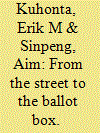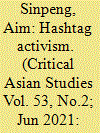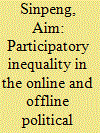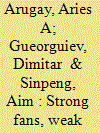|
|
|
Sort Order |
|
|
|
Items / Page
|
|
|
|
|
|
|
| Srl | Item |
| 1 |
ID:
117735


|
|
|
|
|
| Publication |
2012.
|
| Summary/Abstract |
The July 2011 parliamentary elections in Thailand were significant because they ushered politics away from street demonstrations and into the polling booth. Just about a year after the worst political violence in Bangkok since the 1992 Black May incident, these elections confirmed the dominance of Thaksin Shinawatra-aligned parties and the prominence of social movements in engaging the electoral process. Notable were the Red Shirts who moved from street battle to electoral contestation in supporting Phua Thai and the Yellow Shirts who campaigned against politicians and political parties. No election in Thai history has had such a high degree of social mobilization as that of the 2011 polls.
|
|
|
|
|
|
|
|
|
|
|
|
|
|
|
|
| 2 |
ID:
178395


|
|
|
|
|
| Summary/Abstract |
The Thai 2020 anti-government protests were the first large-scale pro-democracy protests in Thailand mediated on Twitter. How has Twitter been used by anti-government supporters and to what effect? This article examines the use of hashtags by activists during the early stages of the Thai 2020 anti-government protests. Using an original dataset of 27,233 Twitter data points drawn from the #FreeYouth (FYM; #เยาวชนปลดแอก) campaign, the article argues that Twitter was used primarily to build collective narratives and disseminate movement information, rather than to mobilize offline protest activities. The key topic conversations within the Free Youth networks focus on discontent towards the government and demands for democracy, suggesting that Twitter was central to mobilizing pro-democracy collective action frames. The article further argues that the Free Youth networks on Twitter were loosely connected through community clusters of weak ties, not tight crowds. The challenge for FYM activists going forward is to support ties across its online networks that will strengthen over time, or risk becoming an ephemeral network of convenience that can only be mobilized on an ad hoc basis.
|
|
|
|
|
|
|
|
|
|
|
|
|
|
|
|
| 3 |
ID:
154261


|
|
|
|
|
| Summary/Abstract |
Does social media reinforce or transcend socioeconomic divides in political participation? The mobilization thesis suggests that social media use can bring previously disengaged or under-represented groups into politics. The reinforcement thesis, in contrast, posits that social media has little impact on existing patterns of political participation and can, in fact, exacerbate them. I test these two hypotheses in the context of street protests in Thailand which occurred from November 2013 through March 2014. I contrast data from the Asia Foundation’s socioeconomic survey of over 300 street demonstrators with unique socio-demographic profile data drawn from 600 Facebook users affiliated with either the anti-government People’s Democratic Reform Committee (PDRC) or the pro-government United Front for Democracy against Dictatorship (UDD). I find that overall, political participants on Facebook were of lower socioeconomic status and a younger demographic profile than offline participants for both sides of the political divide. These findings support the mobilization claim by demonstrating that there is less participatory inequality among online participants. The key implications of this study are two-fold. First, data from Thailand permits an examination of socioeconomic stratification of political participation both online and offline in a country outside the Organisation for Economic Co-operation and Development (OECD) and with profound digital inequality. Second, the similarities in the socioeconomic backgrounds of the UDD and PDRC online supporters, in stark contrast to their offline counterparts, suggest that social media engagement has a mitigating effect on participatory inequalities. Facebook thus provides a new avenue for those not engaged in offline political activities.
|
|
|
|
|
|
|
|
|
|
|
|
|
|
|
|
| 4 |
ID:
193642


|
|
|
|
|
| Summary/Abstract |
This article argues that Thailand’s 2023 parliamentary election was the first election where social media played a decisive factor in the electoral outcomes. Prior to this election, social media was an important campaign tool, but it was unclear whether it made a difference in the electoral results. Based on our original post-election survey data (n = 1,249), social media was the most important media in governing vote choice. Social media was a crucial space for activation and conversion—motivating the undecided to become partisans and converting partisan voters to shift their allegiances. Thailand’s 2023 election was also marked by rising personalization of political campaigning, wherein citizens felt free to decide how and what their political participation would look like, and parties that encouraged inclusive and open engagement with politics were best poised to win in the electoral arena. Drawing on social network analysis of social media data, this article demonstrates how the Move Forward Party’s (MFP) loosely structured and inclusive social media campaigns allowed both their candidates and supporters to mobilize individualized large-scale collective action, in contrast to their rivals who focused on traditional top-down style campaigning. Despite the MFP’s winning social media campaigning that produced electoral victories, the party was unable to come to power due to an entrenched authoritarian political system designed to maintain the power of the country’s autocratic elites. The Thai case demonstrates powerfully how autocrats might lose an election due to social media, but still manage to hang on to power through entrenched authoritarian institutions.
|
|
|
|
|
|
|
|
|
|
|
|
|
|
|
|
| 5 |
ID:
177616


|
|
|
|
|
| Summary/Abstract |
The 2016 presidential contest is widely considered as the first “social media election” in the Philippines. At the same time, it remains unclear if or how social media helped Rodrigo Duterte mobilize voters to gain victory. There are three main social media campaigning models: broadcast, grassroots, and self-actualizing. Analysis of twenty million activities and 39,942 randomly sampled comments across the official Facebook pages of key presidential candidates supports the grassroots model as Duterte's profile was the most engaged, even if Duterte himself was not actively engaged. Such inconsistencies raise the prospect that Duterte's online prominance was fabricated by paid trolls and fake accounts. Instead, our analysis suggests that Duterte's digital fanbase was, at least in part, a reflection of offline, grassroots political support. In particular, data from an original survey of 621 respondents suggests that Duterte supporters were not only aggressive in their support for Duterte online, they were also more committed to him offline as well. These findings add to a growing literature on social media and politics that seeks to understand the broader ecosystem of online political discourse, rather than focusing on the actions and strategies of political campaigns. They also underscore the fine line between fabricated support and genuine political fervor.
|
|
|
|
|
|
|
|
|
|
|
|
|
|
|
|
|
|
|
|
|